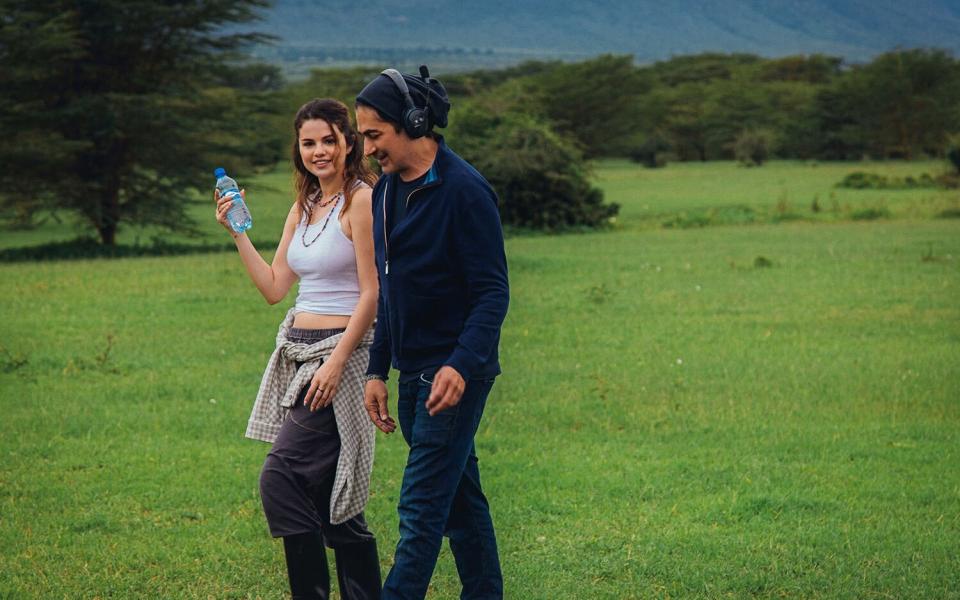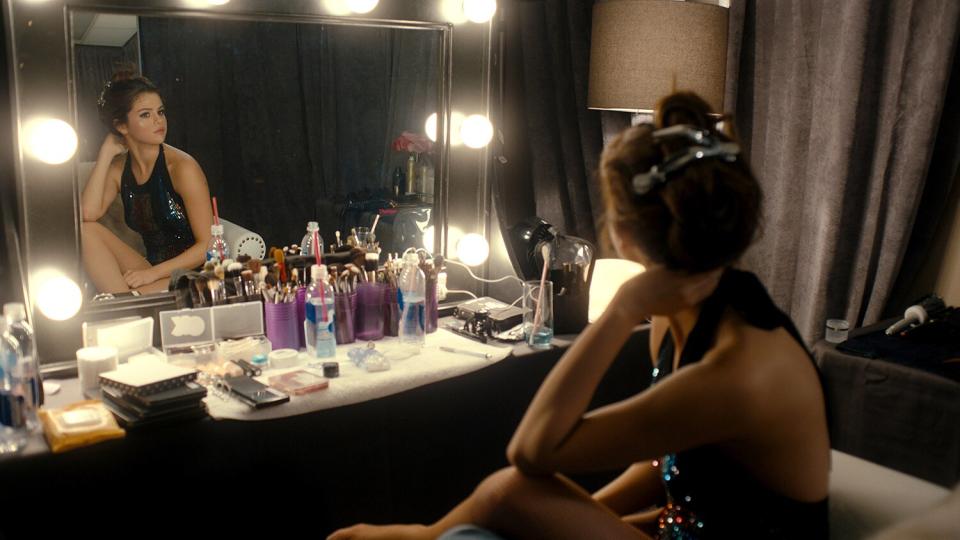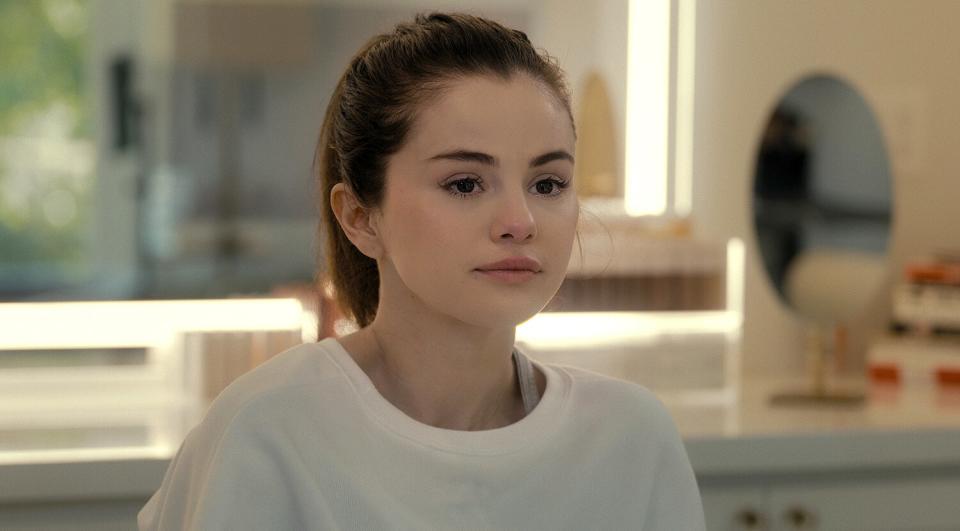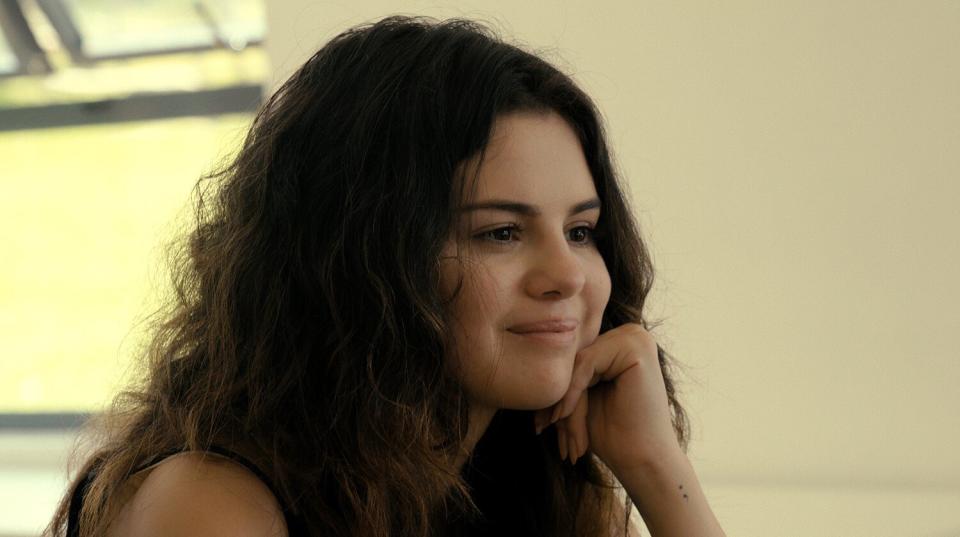Selena Gomez's mom isn't ready to watch her mental health documentary yet
- Oops!Something went wrong.Please try again later.
- Oops!Something went wrong.Please try again later.
- Oops!Something went wrong.Please try again later.
Selena Gomez's mother isn't ready to tune into her Apple TV+ documentary, My Mind & Me, just yet, director Alek Keshishian says.
It isn't too difficult to understand why. The film spans six years of the singer and actress' life, painting an intimate portrait of a young star and her battles with mental health — namely, bipolar disorder, depression, and anxiety — in the spotlight. Her lupus diagnosis and highly-publicized breakup from Justin Bieber are also explored, making for one of her most personal projects yet. "I could feel her authenticity and her vulnerability," Keshishian, who helmed Madonna's acclaimed 1991 documentary Truth or Dare, tells EW.
Such heavy subject matter can be challenging for any parent. "It's very difficult for her and her family, obviously," the director says of the matriarch. "The complicated feelings of a parent knowing her daughter suffered like that." Below, Keshishian speaks about the matriarch's involvement, his initial trepidation to take on the project, and more.

Courtesy of Apple TV+ Selena Gomez and director Alek Keshishian
ENTERTAINMENT WEEKLY: You've said that after Truth or Dare, you didn't want to do another music documentary. What was it about the genre that made you want to wash your hands of it?
ALEK KESHISHIAN: There are two aspects of that. One is, in general, I don't like to repeat myself. And so especially coming off of that, all the offers I was getting were to do similar projects and I didn't want to do that. I wanted to make a narrative film, a fiction film, so I did With Honors instead. Later, I just felt like social media started happening, and I thought, I'm not sure I'll ever be able to make a movie that's as raw and honest as Truth or Dare in the current climate of what passes for documentary in the age of social media.
I signed on with great trepidation. I was so charmed and mesmerized by Selena Gomez because she seemed unlike any celebrity or pop star I'd ever met before. Selena doesn't have much guile, and I thought to myself, "How can this young woman have been working for so long and doesn't seem to have armor?" But it was very intriguing because obviously, I could feel her authenticity and her vulnerability. . . I said, "I tend to really think of what I do as art. And in that respect, I kind of ask for access everywhere and for you to trust my vision and I know that's probably hard for you to give me."
She said, "No, no, I loved Truth or Dare. I watched it seven times. I think it's a piece of art and I'd like to do something like that." So I said, "Let's give it a couple of weeks because I want to make sure that you're really okay with me filming cinéma vérité," which means the cameras are just always rolling. It means I'm not trying to organize a shoot and ask you questions and just showing up for. It's a much more patient kind of filmmaking. And so we shot for two weeks and you see some of that footage in the finished doc.
After those two weeks, we both mutually decided the timing wasn't right. She was so young, so vulnerable, and I felt it wasn't my place to introduce a camera like that into her life when she was going through and struggling so much. It just didn't feel like it had a context to make that correct.
How did you build that relationship and establish trust?
Well, there are no shortcuts. You either feel an immediate soul connection, or it takes time and it takes experiences. Trust is earned over time. Reliability over time equals trust and so there are no shortcuts to that. It's not like I have a magic wand, but I tend to wear my heart on my sleeve and I think most artists and celebrities I work with, because I wear my heart on my sleeve, I think they can see that I'm not very good with the business side of all of it or anything else. I just want to do good work. Even when I did commercials with celebrities, I would always try to get that one moment of authenticity in them. Because to me that's the magic, is when you're able to go beyond the persona and you find that humanity. So, I think it's just a personality that I have that makes people trust me. I've always been that person that people open up to and tell their secrets to because I think they know I'm really, really empathetic.

Courtesy of Apple TV+ Selena Gomez in 'My Mind & Me'
One of the most intimate moments is when she returns to her childhood neighborhood in Grand Prairie, Texas, to reconnect with her old self and former neighbors. What do you remember from this trip?
I think you really see Selena's authentic, down to earth-ness in that sequence. There have been shows that show celebrities going back to their hometowns, but there's always this sense that they arrive there from a higher place and then they come down. With Selena, she's not in a higher place to begin with. It's not like she dresses down to go there. That's really who she is and you can feel that. She's not there in designer clothes or glammed up or anything. And by the way, that's kind of how she lives her life.
So it was very amazing to go through that footage over and over. There was no big production by that point. We were not thinking this was going to be a big documentary, that was just a camera person and Selena. There was no permission that we had gotten. It was not produced. That was just Selena knocking on that door and the person opening it up and her having to interact with them. You see that level of intimacy. It's not a big production that's gone in there that's pre-planned. So that's where you get that rawness, and I think that's why you can feel that her reactions are as intimate as just one camera capturing her.
Were there any moments left on the cutting room floor?
There's tons and tons of beautiful content, but at the end of the day, this is someone's life, and I'm showing vulnerability. I felt like there had to be a certain respect to the amount that I could make or endure. There was a two-and-a-half-hour cut, but it just felt too long to me and she agreed. I think for her, it was just too difficult, and you didn't need that to move other people. Our goal in this movie was always, "What can we do to help other people?" And it wasn't about indulging and going like, "But this is also fun and nice and let's show this; a little bit of this and a little bit of that."
We weren't making a docuseries. My role as a film director, especially in this day and age, is to make you want more, not to make you look at your watch and not to create a documentary that only a limited number of people would have the patience to watch. There were a lot more encounters in Texas. But part of filmmaking is about making those hard choices and that's what took two years of editing.
People ask me sometimes, "Why wasn't Only Murders in this film?" Because they hadn't shot a day of Only Murders when we started filming. It took two years to get you this film in this state. That last moment where she goes to Texas again at the end of the movie, that was her on her way to New York to film Only Murders in the Building. She wanted to stop in Texas because COVID had happened and she wanted to reconnect before she went.

Courtesy of Apple TV+ Selena Gomez in 'My Mind & Me'
The project tracks six years of Selena's life. What conversations have you had with her now that this deeply personal film is out in the world?
Well, it was out there, but then we were doing a lot of promotion because obviously, we care about it reaching people. And the greatest gift has been the type of people reaching out back to us. I've had people I've worked with who are in their 50s go, "I've never heard a single Selena Gomez song but I watched this movie, and it moved me and I want to watch it now with my daughter or my son." There's nothing more rewarding than that, and that gives meaning to just how hard I worked on this. I was working seven days a week and all through COVID, and it was the most difficult thing I've ever done. It's beautiful to see it connecting to people.
With mental health, there are many nuances when you're a person of color. Depression and anxiety are still pretty taboo among many immigrant communities. Did you and Selena have any conversations about this before diving into the project?
There's so many other stories to tell about mental health, like you're pointing out. I'm also an immigrant, from the Armenian community where, again, certainly the older generations, you keep the stuff bottled up. You just carry on. But I think for Selena and for this film, we just couldn't cover everything, so I'll leave that to her in an interview or another opportunity to get into. I think it's really important, though, as a film to open the eyes of some parents from some of those communities who may not understand what a child means when they say, "I'm so depressed" or "I'm feeling this way." That's our hope. When we made this movie, we said we don't just want to make it for people who are already getting the mental health relief that they have. We want to make this movie for everyone. And that's another reason it's 93 minutes — so that you can encourage your parents or your grandparents or whatever to watch this movie and hopefully they can connect to its emotion.

Courtesy of Apple TV+ Selena Gomez in 'My Mind & Me'
Yeah, it felt particularly striking that her mom, Mandy, participated in the project. Were there any reservations on her part?
There were huge reservations. I got her at the very end because it's very difficult for her and her family, obviously. The complicated feelings of a parent knowing her daughter suffered like that, and that she wasn't able to help. They've healed their relationship and they're in a really good place but obviously making a documentary or even speaking about it in a sense, it's like recutting yourself a little bit and having to face that moment again.
It was a very delicate discussion and I was so happy and amazed, because Mandy is a really brave woman and she does a lot of work as well to help in the mental health space. And you see where Selena gets that desire to help others and to treat other people as equals, and it all comes from Mandy, in her upbringing. I was just myself and I spoke to her for a while before she agreed to do it. She was nervous on the day, and we just did our best.
And again, I kept the crew small and I showed her little bits of the film so she knew a little bit about what it looked like. I applaud her for it because the courage it takes for a mother to not only live through this, but to then examine it and talk about it, I just think that's amazing.
Do you know if they've watched the final product? What do they think?
Well, Selena definitely has. The last I heard, Mandy hasn't yet felt ready to watch it. And she talks about it on a recent podcast she did, where she says she's not quite ready because of the pain for her of watching what her daughter went through, she's not ready quite yet to face. But they're in a beautiful place in their relationship.
This interview has been edited and condensed for length and clarity.
Selena Gomez: My Mind & Me is now streaming on Apple TV+.
Sign up for Entertainment Weekly's free daily newsletter to get breaking TV news, exclusive first looks, recaps, reviews, interviews with your favorite stars, and more.
Related content:

